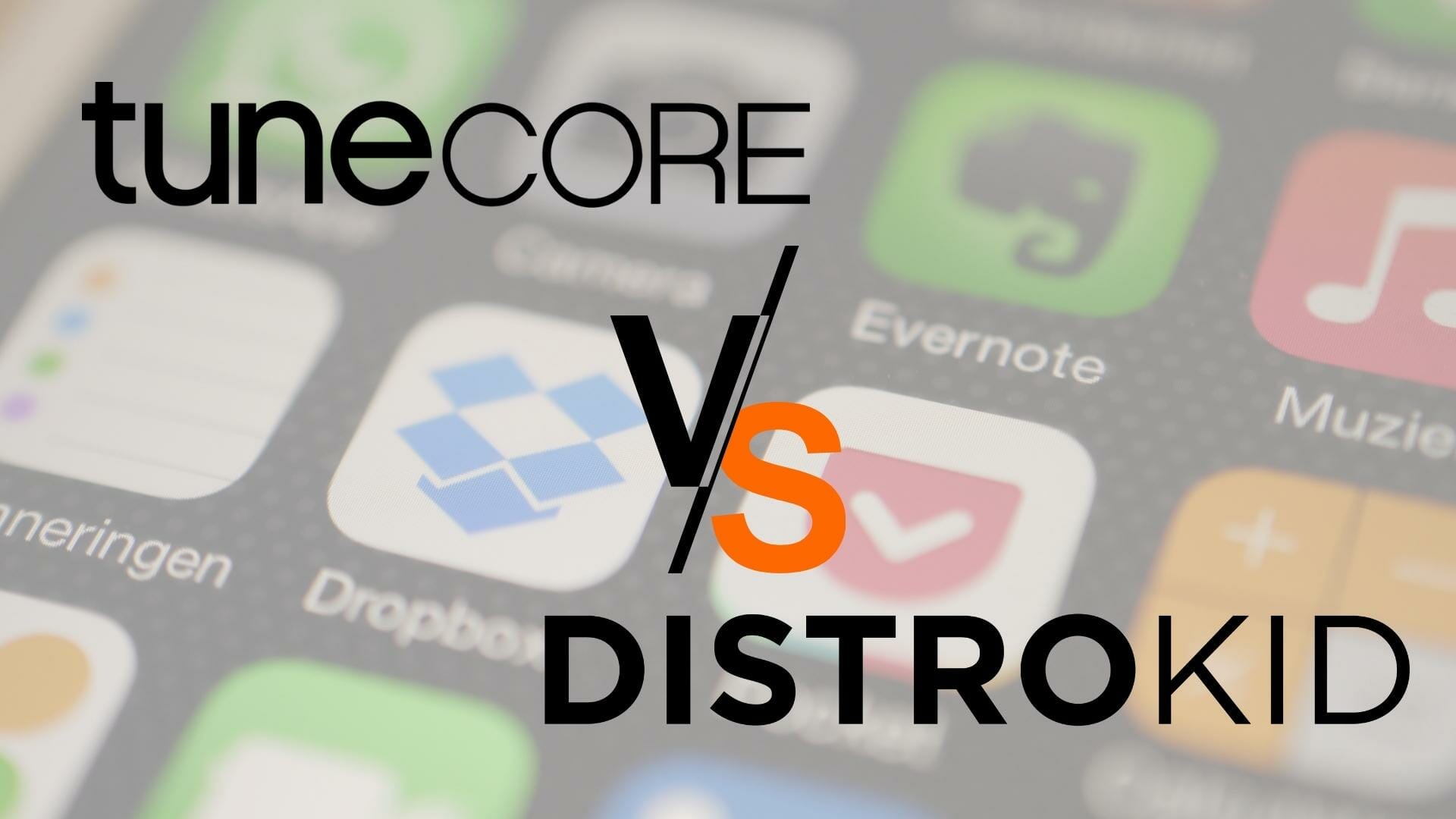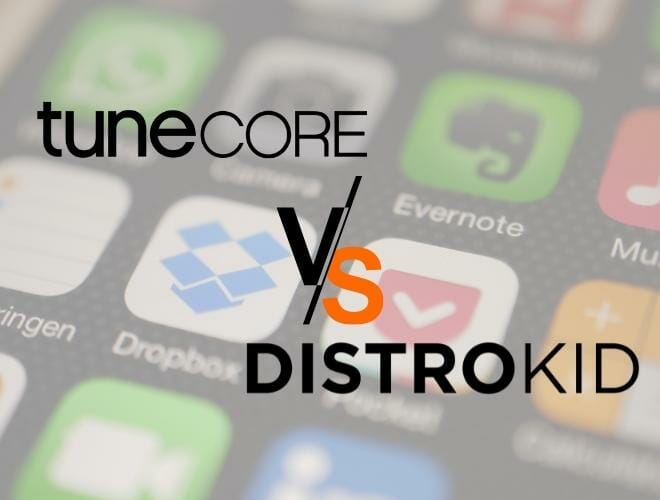Tunecore vs Distrokid – What’s the Best Choice for Your Music
Are you ready to put your music out there and promote it? Dope. Are you having problems deciding how to make it public? We’ve got you covered. In this article, we’ll compare Tunecore vs Distrokid to help you decide which firm is better for your upcoming music release. We’ll discuss who they are, what makes each company unique, and which choice we recommend. Spoiler Alert: TuneCore is our chosen distributor for getting your music onto all of the major platforms, retailers, and outlets. Why? Let’s talk about it. Make no mistake: both companies are excellent options for selling your music, but Tunecore is the better option in our opinion. Not only have they represented some of the world’s biggest musicians, such as Russ, but the Brooklyn, NY-based company was founded in 2005, whereas Distrokid launched in 2013. Distrokid started as an “add-on” service to the music social network Fandalism before becoming a separate firm in 2015. Tunecore, on the other hand, has nearly ten years more knowledge, relationships, and a track record than Distrokid. They also have offices all over the world and direct relationships with the digital retailers where your music will be distributed. Distrokid is a smaller (and newer) label, but they began a programme with record companies this year to assist them in discovering new talent (for a “finders fee,” of course). In general, both firms provide similar music distribution services. However, each organisation has a few “extras” that may affect your decision. Let’s start with the second major distinction between the two competitors: their price methods. Tunecore bills you for each piece of music you release, whether it’s a single or an album. So, if you want to release four albums this year, you’ll have to pay for each one separately. You’ll get a discount on your first release ($39.99 for an album, $9.99 for a single), but after that, regular pricing ($59.99 for an album, $11.99 for a single) will apply. It’s also worth noting that the album/single will need to be updated every year. TuneCore also allows you to create a ringtone (do people still use those?) for $24.99 a year. Currently, DistroKid does not offer ringtone releases. Distrokid, on the other hand, is a subscription service that allows you to download an infinite amount of releases irrespective of the plan you choose. Musician ($19.99 per year), Musician Plus ($35.99 per year), and Label ($79.99 per year) are the three main options. The basic account allows you to release music for one artist, while the Musician Plus plan allows you to release music for up to two artists, and the label plan allows you to release music for up to five artists. You’ll be charged more on a scale based on your needs if you need to release more than five distinct artists. Because you pay per release rather than a monthly price, TuneCore allows you to distribute an endless number of different artists (or an unlimited number of artist names if you compose different sorts of music). To receive all of the Distrokid addons, for example, the ordinary “Musician” plan would cost $84.86 for your first release, $64.87 for each additional single, and $112.78 for each additional album (10 tracks). Do you have a song that you’d like to cover? That’ll cost you another $12. Oh, and if you acquire the YouTube Content ID addon, they also steal 20% of your YouTube ad earnings. That’s not to say TuneCore doesn’t provide extras; their “TuneCore Social” service costs $10.99 a month. And, if you want to use YouTube or Publishing, those services cost $12 and $99 respectively as a ONE-TIME charge, not every release. Moreover, TuneCore allows you to purchase additional distribution credits at a 15% discount. The credits, however, can only be used for new releases and not for renewals of prior releases. Let’s take a closer look at the basic service and the extras that both providers provide. Both companies provide basically the same service: they will distribute your music to all of the major online music streaming and sales platforms (150+). They both provide insights and tracking for your sales, among other things. Finally, for both organisations, the upload process and settings are essentially the same. When you look beyond the “bread-and-butter” functions, though, the disparities in service become apparent. TuneCore simply exceeds DistroKid in terms of customer care and support. They’re a decade older than DistroKid and have a lot more offices/employees, so if you have a problem or have questions, you can quickly contact someone and receive help. TuneCore’s Artist Support Team is available 24 hours a day, 7 days a week. They’re taking this seriously and will respond within one business day. They also respond to DMs on social media and provide phone support if needed. The service provided by DistroKid is… less than ideal. You can contact them (if you can find their contact information buried in their FAQ), but it won’t be pleasant. Response times are slow, and they aren’t usually that helpful (but that’s just my opinion). TuneCore also features a more informative blog for aspiring musicians, as well as partner discounts on products and services that musicians may find useful (like product manufacturing, for example). However, in my perspective, those are “meh” bells and whistles that don’t mean much but seem good. DistroKid is essentially a low-cost “get your music on streaming sites and music shops” service. That isn’t a criticism; they are still a wonderful company. When it comes to value-added services, however, TuneCore goes above and beyond. If you use their Music Publishing Admin add-on, for example, your music is immediately considered for any TV/Film/Ad/Game sync chances they come across. Furthermore, they strive to provide new chances for its artists, such as their new Reward card, which allows musicians to gain access to VIP masterclass sessions to help them advance their careers, as well as discounts and other benefits. Those opportunities seem to me to be far more valuable than DistroKid. There are also some variations between the companies’ add-on services. Let’s start with the “addons” Distrokid offers, which we touched on briefly previously in this essay. Things start to get REALLY exciting at this point. Both firms pay all royalties and sales to the artists – you get 100% of what they make. But that isn’t the whole tale. TuneCore is able to negotiate directly with music platforms due to its dominance in the business. The majority of other distribution companies are unable to do so. What this means for you as an artist is that you will receive 100% OF THE MONEY PAID OUT BY THE STORE. Because companies like DistroKid can’t work with shops directly, they rely on middlemen (in DistroKid’s case, a company named Merlin to collect payouts). Unfortunately, before it reaches DistroKid, middlemen take a cut. So, while DistroKid receives 100 percent of the money from Merlin, they do not receive 100 percent of the store’s payout. TuneCore’s payouts to artists are so superior. In fact, they’ve given out over $2,000,000,000.00 to artists over their existence. (That’s two billion dollars.) For all of the reasons stated above, I believe it is safe to say that we are HUGE fans of TuneCore. I’ve used DistroKid to release music in the past and found it to be good, but I want to continue using TuneCore in the future. They’re simply the better choice, from their customer care to their bigger payouts to artists and the more beneficial extras that come with the service. That’s why, when it comes to independent music distribution services, they’re our top recommendation. DistroKid is a fantastic company that provides excellent service. TuneCore, on the other hand, outperforms them in the areas that matter to us. TuneCore is the way to go if you’re planning to release your song soon.
Quick Comparison Chart
Tunecore:
Distrokit
Pricing
7/10 – Higher up-front cost
9/10 – Cheaper up-front cost
Basic Service
9/10 – 150+ store reach, high-value-added opportunities for artists
8/10 – 150+ store reach, decent “bells and whistles” extras
Premium Addons
8/10 – Mostly a ONE TIME fee (YT Ad Revenue, Publishing Admin)
7/10 – Lots of paid add-ons that get expensive fast (paid PER RELEASE)
Payouts to Artists
10/10 – Artist gets 100% of STORE payouts
6/10 – Middleman takes cut of store payouts
FINAL SCORE
34/40
30/40
What are Tunecore and Distrokid All About?

Differences Between Distrokid vs Tunecore
Pricing Differences

Why DistroKid Isn’t REALLY Cheaper than TuneCore.

Service Differences between DistroKid and TuneCore
Artist Support
Added Value Services
 Distrokid claims to have some amazing extra features, such as obtaining you a “blue check” on Spotify quickly, allowing you to publish your lyrics to select sites, and backing up your music in case you lose your master recordings.
Distrokid claims to have some amazing extra features, such as obtaining you a “blue check” on Spotify quickly, allowing you to publish your lyrics to select sites, and backing up your music in case you lose your master recordings. Premium Add-Ons
DistroKid offers the following paid addons for your releases:
Tunecore also has some paid addons artists may find useful:
Payouts to Artists
Bottom Line – Who to Go With




